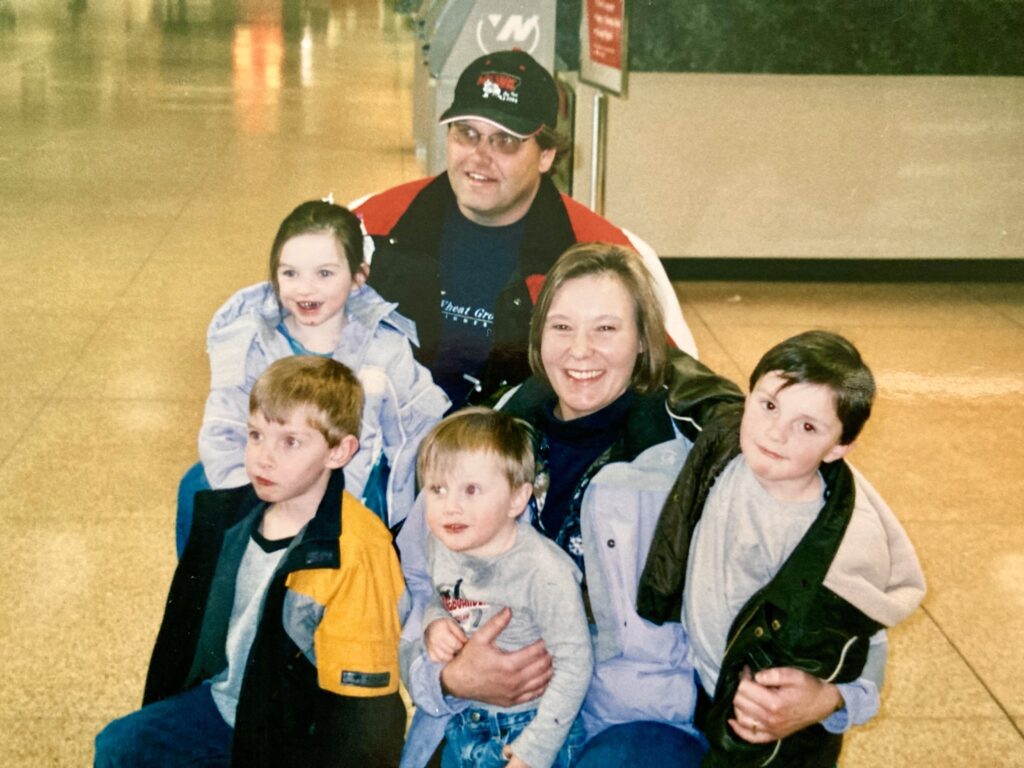Gotcha Day
January 24, 2024
In the language of adoption, Gotcha Day is when your children arrive in your home. This week, 18 years ago, Gotcha Day happened for us.

We adopted our four children from the foster care system 18 years ago: all siblings and all at once. We essentially became parents overnight!
The idea of having a family did not cross my mind until I was in my mid-thirties. My husband and I were not sure we wanted to have children. However, as we both grew older, the idea of having a family became more and more prevalent in our lives. We could not have children biologically, so we started looking at other options for creating a family.
Foster Care Adoption
According to a 2021 report from the Adoption and Foster Care Analysis and Reporting System, over 606,000 children have passed through the foster care system over the course of a year in the United States. In that same year, 64,985 children were waiting to be adopted, with the 15-20-year-old age group being the most significant percentage. When children age out of foster care, they are on their own.
It wasn’t because of these statistics that we chose to adopt from foster care; it was because of doing respite care for a foster care family for a young boy. I also worked with a parent who adopted a sibling group from foster care. She was a tremendous support with our adoption process.
Expectations
We had expectations about our family life: days filled with joy and happiness, rainbows, and tripping through snowdrifts (it was January in Minnesota when they came to our home). Oh, we knew there would be times when we would struggle. I had read many parenting books about adopting children from hard places. I was prepared! Yeah right!
I am glad my husband and I didn’t realize how little we knew then. Our expectations of parenting did not match our reality. Not even close! There have been times of tremendous joy and happiness, countered with times of being overwhelmed, worrying, and struggling. It’s not easy going from 2 to 6 people in a house overnight.
I had to let go of the expectations of a perfect family. However, I gained so much more by letting go of those expectations!
Trauma-Informed Care
Our children came from a hard place. Their early childhood was less than idyllic. In a podcast interview with Dr. Bruce Perry, he suggested that when observing a person’s challenging behavior, instead of asking, “What is wrong with this person?” we should ask, “What has happened to this person?” In early childhood, adverse experiences and trauma can have a lasting effect on a person’s health, behavior, and learning.
For me, the work of trauma-informed care for my children came from a place of self-preservation. I needed to understand why our children behaved in the way they did. Going from zero to four was not as easy as I thought!
The lack of sleep and stress was taking a toll on me. The point that I knew I needed to focus on my self-care came when my son asked me if I was tired. I wondered why he wanted to know. He said, “When you are tired, Mommy, you get mad.” He was afraid that I would get angry with him.
I found myself yelling at my kids and flipping out over little things. Lack of sleep and stress can do that to a person. I felt sad when my son said he was afraid of me. I knew I didn’t want my children to be fearful of me. I needed a change in my parenting style, and it needed to start with me.
It’s easy to blame problems on another person or the situation when the person in the mirror is part of it. It wasn’t comfortable or easy for me to become aware that my kids were potentially afraid of me. I didn’t want them to be frightened; I loved them. The first step of self-awareness is a shock to the ego. I need to start practicing some self-regulation skills.
I made dealing with my self-regulations a family affair. I put an app on my phone that would randomly ring a bell. We would all stop what we were doing and take three (or more) long, deep breaths together. I was creating a practice of mindfulness.
I had to be a role model for my children, and I knew there was always a need and feeling behind challenging behavior. I need to recognize my feelings and needs before helping my children. I had to be the one to make the change because I was the adult!
You don’t always know what’s happening in a child’s life. We especially didn’t know the details about our children’s past experiences. We did learn they came with adverse childhood experiences, traumatic experiences of abuse, neglect, loss of family, and maybe more.
When looking at a child’s behavior, ask yourself:
- What has happened to this child?
- What is the child’s story?
- How can I give them some grace in a stressful, overwhelming year?
- How can I be the calm, caring adult in this situation?
There are many challenging experiences adults and children go through in life. Life’s challenges can be difficult for an adult to process and handle. Now, think about a child. A child doesn’t have a mature brain, experiences, and skills to draw upon to get them through these challenging times.
Adverse and traumatic life experiences can be difficult for a child to process and handle. However, when a child has positive experiences from supportive adults, they can develop into the caring and calm adults we need in the future. You can be the supportive adult for a family or child right now!
